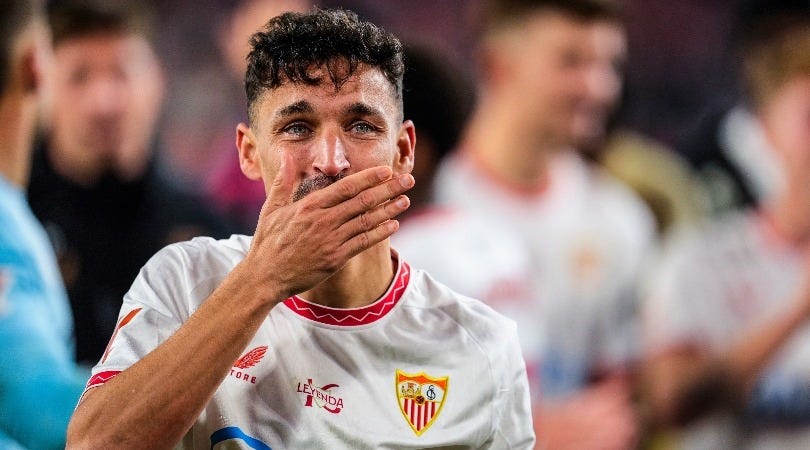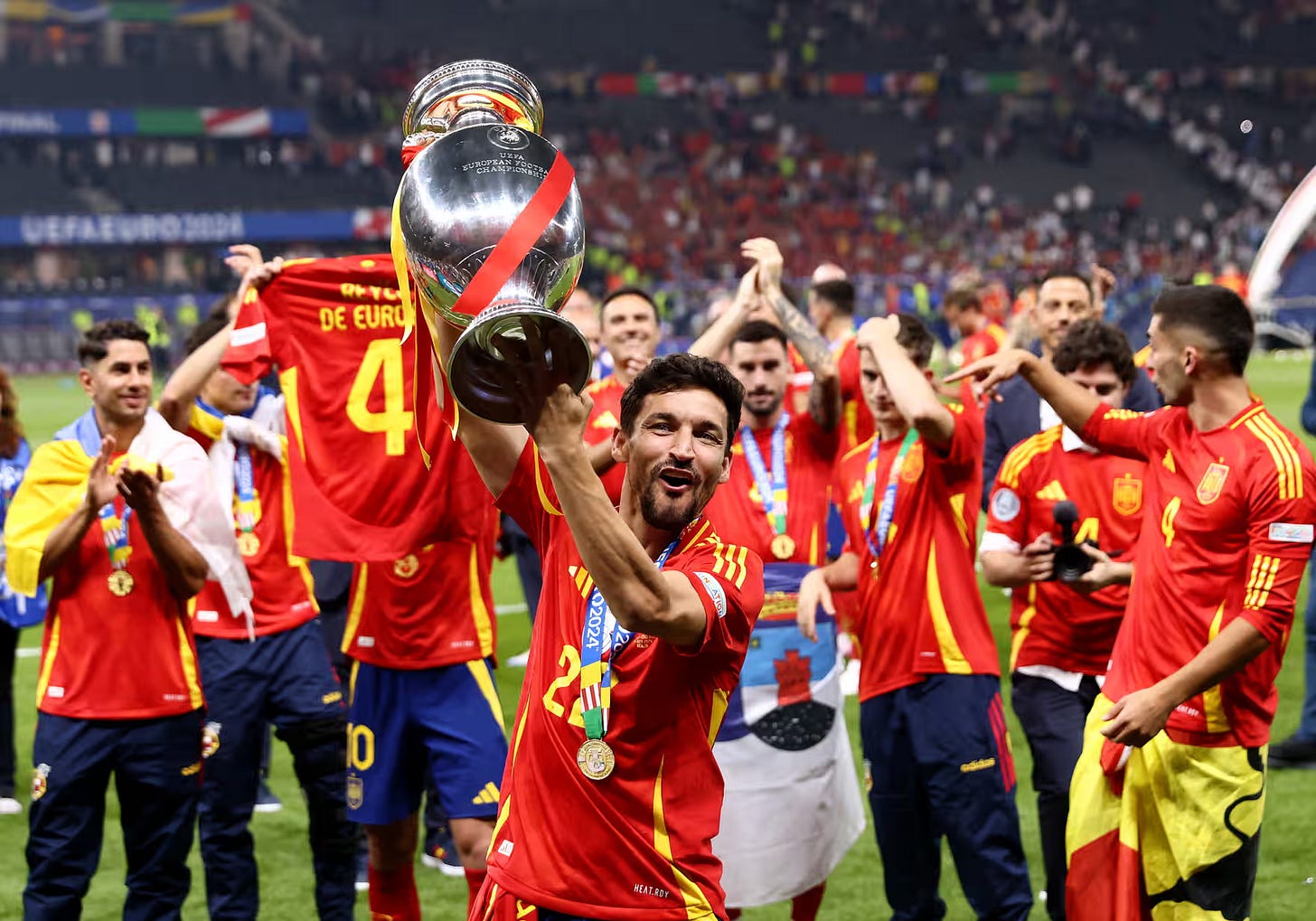Jesus Navas' Painful Goodbye
Jesus Navas will say goodbye to football and to Sevilla on Sunday. And it will hurt.
Jesus Navas is in pain.
Partly because he is 39, has an arthritic hip and is still playing professional football. And partly because on Saturday, he played his last match at Ramon Sanchez-Pizjuan. And today, against Real Madrid at the Santiago Bernabeu, he will play his last match ever. He will bid a tearful goodbye to football. His football. And his Sevilla.
He is in pain now and has been for four years, but he still plays. Even, in truth, when he shouldn’t. “These last six months have been very, very hard. After games it’s difficult to walk,” Navas said, speaking to Sid Lowe from The Guardian.
“It’s purely physical: I’m stopping because I have to. I’m happy with what I’ve achieved,” he says, the words hanging heavy in the air. Not because he wants to and certainly not because he’s ready. “Because I have to.”
It’s a farewell that feels both inevitable and impossible. Inevitable because the human body has its limits, even for someone like Navas, who has defied them longer than most. Impossible because Navas and Sevilla are inseparable.
For the better part of two decades, they have been one and the same: a boy from Los Palacios who became the man who defined this club. His club. His mark is all over — in the way the fans chant, in the way academy players train, and in the place they train too, with the Sevilla B team’s home ground having been renamed in his honor.
And now, here he is, 39 years old, preparing for his 705th and final appearance in the only shirt that has ever truly felt like his own.
The truth is that Navas has been playing in pain for years, a private battle fought in public. The hip that’s given him its best can no longer do so. The pain has been nagging, relentless.
“These last six months have been very, very hard,” he admits. He can’t walk after games, he can’t sleep either, and he worries about being able to get up in the morning, being able to play with his children. But he played anyway. For Sevilla. Always for Sevilla.
Because that’s what Navas does. He gives everything, even when there’s nothing left. This season, like the ones before it, has been “madness,” he says. But he kept going. Kept running, kept crossing, kept carrying Sevilla forward. Because that’s what this means to him. It’s not just his responsibility to give everything; it’s his duty.
It’s easy to talk about the numbers: 705* games, more than anyone else in the club’s history. Eight trophies, including two UEFA Cups, two Europa Leagues, one UEFA Super Cup, two Copa del Rey titles, and a Spanish Super Cup for good measure.
He won all that could be won, and in the process, transformed Sevilla from a club that hadn’t won anything in 55 years to one of Europe’s most decorated in the 21st century. But Navas’ legacy is not just in the medals. It’s in the moments. The lung-busting runs down the wing, the inch-perfect crosses, the unwavering commitment to the team he calls, faithfully and at every single mention, “my Sevilla.”
He is the embodiment of what Sevilla stands for. A player who rose through the academy, who suffered crippling homesickness as a teenager but who stayed. He made his debut in 2003, aged just 18, and now prepares to say goodbye, aged just 39, by his standards.
It’s a goodbye that’s coming much later than most would choose, but still far too soon for him. This comes five months after he said goodbye to the Spain national team, calling time on a career that began with him winning the World Cup in 2010 and the Euros in 2012 in his mid 20s, and after a 12-year hiatus, ended with him winning the Euros once more in 2024, in his late 30s this time.
Navas is a player who gave his all for the club, even when he left. In a career that spanned 21 years, he spent just four of them away from Sevilla, at Manchester City. But those four years weren’t a betrayal, they were a sacrifice, made because Sevilla were in need and he is the one to deliver. Always.
Financial difficulties forced the club’s hand, and Navas didn’t hesitate. “Manchester was wonderful. Going wasn’t such a hard decision [as it seems]. Sevilla were in difficulty, that appeared, and I didn’t doubt,” he says now about a move that happened then.
And when the time came, four years later, he returned. Of course he did. He always would have.
But there’s no coming back now. This is the end, and Navas can be forgiven for struggling to come to terms with it. “It’s hard,” he says. “I still can’t imagine it. My whole life has been spent doing what I most love. And now…” He pauses, the weight of the moment almost too much to bear, the reality of a life without football, without Sevilla too hard to conceive. “But in the end, it’s a question of health.”
Health, yes. But also time. The cruel, relentless march of time that spares no one. Navas knows this. He’s known it for years. But knowing doesn’t make it easier. Not when every part of him still wants to play. Not when he’s spent four years pushing through the pain for just one more game.
“I have spent four years with this situation and every two or three days, I get a fright. But I keep going thinking that maybe I can make the fans happy for one more day,” he said.

And that, ultimately, is what Navas has always been about: making the fans happy. Giving them everything he has, and then a little more. He’s done it for 21 years, and today, against Real Madrid, he’ll do it one last time. He may start the match and be given an ovation of the highest order when he leaves. Or he may be brought on as a substitute, the feeling of being called upon to serve Sevilla filling his heart one last time.
There will be tears, just as there were at the Sanchez-Pizjuan last weekend. Tears of gratitude, of pride, of heartbreak, from him and from everyone, really. And then, the final whistle.
Football will lose an immense player today. A player who was more than just a footballer. A player who stood for loyalty, for love, for something bigger than himself. Sevilla will lose its greatest servant. And Jesus Navas will lose the game that has been his life.
He’s in pain. He’s been in pain for years. But today, as Navas walks off the pitch for the last time, the pain will be something else. He will have left a part of himself behind, a part to stay with Sevilla forever, even when he can’t anymore.
His hip will undoubtedly hurt for days after the match. But Navas knows, his heart will hurt for much longer.






